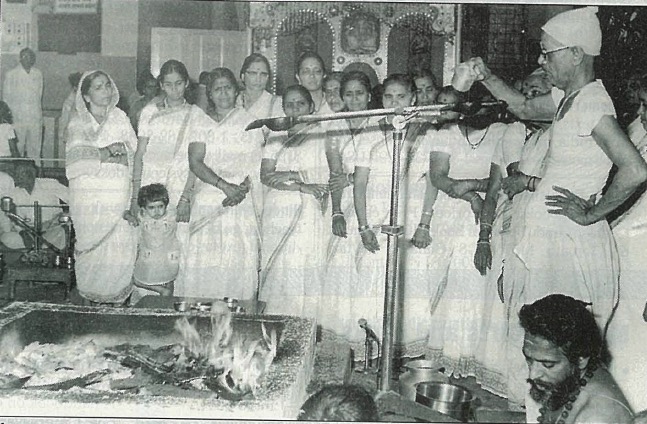By V.L. MANJUL, PUNE
The City of Pune, in Western India, has not only been a prominent cultural center, but has also been swift to assimilate modern trends. It was here in Maharashtra state, for example, that many first came forward and called for the education of women and for widow remarriage.
In 1975, one ranking harbinger of social change, Shri Shankarrao Thatte, began the training of ladies in priestly duties. At his residence he initially established two marriage halls where he tutored a small group of 15 to 20 ladies in various stotras and pujas. He also trained them in the intricate and mystical knowledge of Sanskrit mantras, Sri Rudram, Mahima, sacrificial tantra, marriage rituals and thread ceremonies. The distaff priests began to perform yajnas to the various Deities. After a few years, having graduated 8 to 10 groups, Shri Thatte arranged a trip for them to demonstrate their liturgical prowess to Indian and Hindu residents in England and Germany.
Since his death in 1987, his wife, Mrs. Pushpabai Thatte, has advanced his work under the name of Shankar Seva Samiti. It has now spread to all parts of Maharashtra. The idea of Hindu priestesses has been accepted by most educated people, welcomed as a revolutionary step in Indian society.
Not unexpectedly, orthodox male priests and sastris of Pune have criticised and opposed the trend, claiming it is against Vedic law. According to them, this is the first time in the Vedic Hindu religion that women have assumed the priesthood.
Dr. T. H. Dharmadhikari, a well-known shrauta pandit, told Hinduism Today there is no precise mention disallowing women to recite Vedic mantras. There is certain evidence of women’s performing the thread ceremony, but there is no clear Vedic sanction one way or the other.
These ladies are said to be more honest and pious than their male counterparts. While male priests today may not understand the meaning of the mantras they recite, the ladies are trained to offer explanations. Day by day there is a growing shortage of priests in our society, while people are becoming more and more religious. Some have begun to depend on modern technology such as tape recordings of pujas. The ladies are taking responsibility for these religious families, who express satisfaction with their sacred duties.
Communities outside India are also discovering the value of competent priestesses. In South Africa and Trinidad, for example, the Arya Samaj panditas are much in demand for ceremonies and ministry.
